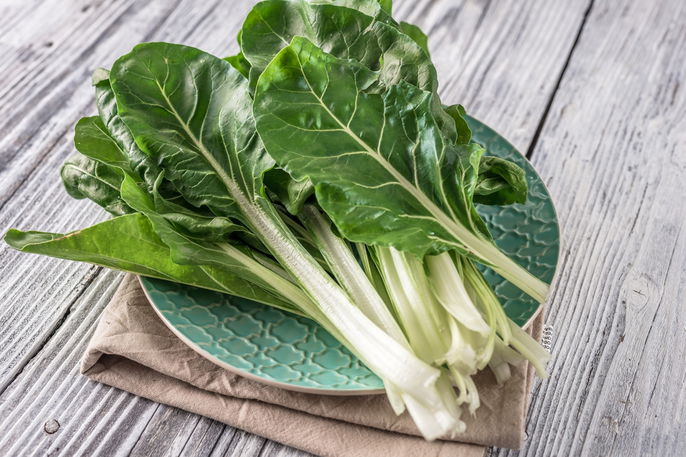Chard is a vegetable that is high in fiber and can be consumed to regulate bowel movements, prevent constipation, and promote overall gut health. It can also help to keep you fuller for longer, making it a great food option for a weight loss diet.
Chard is also rich in vitamins, minerals and antioxidants that contain anti-inflammatory, anticancer and hypoglycemic properties. Therefore, they can also play a role in managing diabetes, promoting heart health and preventing diseases, including cancer.
Chard has white stalks, dark green, smooth leaves and has a slightly bitter flavor. It can be purchased at grocery stores and farmer's markets and can be added to salads or juices, or cooked in soups, stews and pies.

Health benefits
The main health benefits of chard are:
1. Regulating blood sugar
Chard contains many fibers that can slow the absorption of sugar from food. This can help to manage blood glucose levels and help to prevent the onset of insulin resistance and diabetes.
Chard also contains flavonoids, which are compounds with antioxidant action that protect insulin-producing pancreatic cells. This can also help to keep blood sugar levels in diabetics within normal levels.
2. Preventing cardiovascular diseases
Chard contains antioxidant and anti-inflammatory compounds that can help to reduce LDL cholesterol levels and the formation of fatty plaques in the arteries. Therefore it can help to reduce the risk for a heart attack or stroke.
Chard also contains potassium, a mineral that eliminates excess sodium through urine. Therefore, this vegetable can help to control blood pressure and improve blood circulation.
3. Boosting immunity
Chard contains flavonoids, tannins and catechins, which are bioactive compounds with antioxidant and anti-inflammatory properties that can strengthen immune system cells. Therefore, chard can be consumed to prevent and treat viral infections and allergies.
4. Promoting weight loss
Because it is high in fiber and has a low glycemic index, chard can promote weight loss. It can keep blood sugar levels within normal levels, which can regulate blood sugar levels, keep you full and reduce overeating throughout the day.
Chard is also low in calories and fat, making it a great option to include in a weight loss diet.
5. Maintaining eye health
Chard can contribute to eye health as it is naturally high in beta-carotene. This is a pigment that is needed for the formation of vitamin A, which is a vitamin that is important for vision and prevents the onset of diseases like xerophthalmia, glaucoma, cataracts and macular degeneration.
6. Preventing cancer
Because it is rich in flavonoids, kaempferol and catechins, which are antioxidant and anti-inflammatory compounds that fight free radicals, chard can help to prevent some types of cancer, like breast, pancreatic and lung cancer.
7. Preventing anemia
Chard has excellent amounts of folic acid, a vitamin that is needed to produce red blood cells and prevent the onset of megaloblastic anemia. This is a type of anemia that can cause symptoms like fatigue, hair loss and muscle pain.
8. Fighting constipation
Because it is high in fiber, chard can stimulates natural bowel movements and adds bulk to the stool to help treat constipation.
9. Preventing osteoporosis
Chard is also rich in vitamin K, a vitamin that contributes to normal osteocalcin levels. This protein is responsible for fixing calcium in the bones, and is important for preventing osteoporosis and fractures from falls and injuries.
10. Improving mood
Chard is a great source of magnesium, which is a mineral that is needed for the production of serotonin. Adequate levels of serotonin help to regulate mood, anxiety and happiness.
Nutritional information
The following table outlines the nutritional information for every 100 g of raw and cooked chard:
To obtain the benefits that chards have to offer, it is important to maintain a balanced diet and active lifestyle.
How to eat
There is no specific amount of chard you should eat per day. However, the daily recommendation for vegetables is between 2 and 3 servings. This corresponds to about 160 to 240 g per day.
Chard can be consumed raw in salads and juices, or cooked in recipes for soups, stews and pies.
Healthy recipes

Some healthy chard recipes include salads, stir-fries and juices:
1. Swiss chard salad
Ingredients:
- 5 lettuce leaves
- 2 chard leaves
- 8 cherry tomatoes or 2 common tomatoes
- Pieces of white cheese
- Juice of ½ lemon
- 1 pinch of salt
- 1 tablespoon of chia, linseed and sesame seeds
Directions:
Wash the lettuce leaves, chard and tomatoes well. Chop the tomatoes and leaves and add in a bowl. Then add the rest of ingredients, mix well and serve immediately.
2. Sauteed chard
Ingredients:
- 5 chopped chard leaves
- 1 glass of water
- 3 crushed garlic cloves
- 2 tablespoons of olive oil
- Salt and black pepper to taste
Directions:
Add the garlic and oil to a frying pan and sautee until golden. Then, add the chopped chard and season with salt and black pepper to taste. Add small amounts of water little by little, mixing well. Turn off the burner as soon as the leaves start to reduce in size and are cooked. Wait for it to cool and serve.
3. Chard and orange juice
Ingredients:
- 1 chard leaf
- 2 ripe oranges
Directions:
Wash well and tear the chard by hand. Squeeze the oranges and put the juice in the blender. Add the chard leaf to the blender and blend well until smooth. Serve immediately and, preferably, without straining.
Contraindications for consumption
Chard should not be consumed by people who have kidney stones or a greater tendency to form them. This vegetable contains oxalic acid, a compound that can favor the formation of kidney stones. Large amounts of oxalic acid can decrease calcium absorption, so people with hypocalcemia should consume cooked chard to reduce the amount of this compound.
Chard is also rich in vitamin K and is not recommended for people taking anticoagulant medications.






























